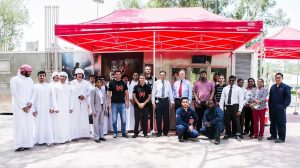Abu Dhabi, February 28, 2015 – In the presence of H.E. Dr. Amal Al Qubaisi, Director General of the Abu Dhabi Education Council (ADEC) and Mr. Aref Al Awani Abu Dhabi Sport Council General Secretary, over 3,000 students from Cycle 1 and Cycle 3 schools took part in the Abu Dhabi Education Marathon, as part of ADEC’s Champions of Tomorrow campaign.
The marathon, which was hosted at the Yas Marina Circuit, aims to instill a culture of sports among students and develop a pool of top athletes capable of representing and honoring the UAE in regional and international athletic tournaments.
Her Excellency said: “The marathon is an important event that will help drive the success of the ‘Champions of Tomorrow’ campaign since it represents ADEC’s commitment to providing national teams with talented athletes who will help raise the UAE flag in regional and international sport forums. The wide turnout of the marathon reflects the confidence schools have in the education reform, which continues to add quality initiatives that help support development and competitiveness.”

Mr. Mohammed Salem Al Dhaheri, ADEC’s School Operations Executive Director, added: “The Abu Dhabi Education Marathon is an important addition to our tireless efforts to foster a favorable environment for sports in schools which can help identify and encourage promising talents that can support our national Olympic teams. The broad participation of students and parents along with the educational and social community reflects the effectiveness of this initiative in creating a positive impact in the development of sports across schools in accordance with the highest standards of excellence and professionalism.”
“We are proud of what has been achieved by students who participated in the Abu Dhabi Education Marathon. In line with the vision and directives of our leadership, we are committed to provide the necessary support for the outstanding talents and pave their way to attain the highest quality achievements in the local and the international sporting arenas in the future,” concluded Mr. Al Dhaheri.
The marathon featured a highly competitive field of students aged eight to ten years old for the 1 km run. The second race spanned a distance of 3 km, while students enthusiastically completed the third segment’s 5-km length.
Al Tareq Al Ameri, CEO of Yas Marina Circuit said: “We are delighted to welcome so many budding young athletes to the circuit today. We work very closely with the local community encouraging all to lead a more active and healthy lifestyle and it is particularly important to see the next generation taking part in sports with such enthusiasm. Our partnership with ADEC to host this inaugural ADEC Schools Marathon is a great honor for us and we are pleased to be supporting the UAE Government¹s initiative to build a generation of talented athletes.”
Salem Al Odd and Hamda Khaled won first place in the 1K race, while Hazaah Souud and Taif Al Jesmi topped the marathon’s 3K race and Khalif Al Nasri headed the 5K run.
The marathon was not limited to students of Abu Dhabi schools only, but also included an ‘Open Race’ comprising parents, administrative faculty, staff members, and employees from ADEC along with the local community. Moreover, there were other activities conducted within the marathon, including a free art stand, heritage village, challenging games, walking the circuit, and Jiu-Jitsu.
ADEC continues to launch quality initiatives under the umbrella of the Champions of Tomorrow campaign, which aims to promote awareness about the importance of sports among schools in Abu Dhabi, Al Ain and the Western Region. It also seeks to encourage schools to be more responsible in nurturing sports talents and in establishing it internationally.
The campaign includes a series of sports competitions which will be held in four categories, namely, Mandatory Games (football and athletics), Individual Games (swimming, gymnastics, fencing and judo), Complementary Games (handball, basketball and volleyball), and Competitions and Special events such as racing, cycling, and a beach festival.
-ends-
About Abu Dhabi Education Council:
Abu Dhabi Education Council (ADEC) was established in accordance with law No. 24 of 2005, issued by His Highness Sheikh Khalifa Bin Zayed Al-Nahyan, the UAE President, the Supreme Commander of the Armed Forces and the Ruler of Abu Dhabi. The Chairman of ADEC is H.H. Crown Prince of Abu Dhabi and Deputy Supreme Commander of the UAE Armed Forces and the Vice-Chairman is H.H. Sheikh Mansour Bin Zayed Al-Nahyan, Minister of Presidential Affairs. The Council seeks to develop education and educational institutions in the Emirate of Abu Dhabi, implement innovative educational policies, plans and programs that aim to improve education, and support educational institutions and staff to achieve the objectives of national development in accordance with the highest international standards.
###
For more information about ADEC please call its headquarters at +971 (2) 6150 000 or visit our website:
About Yas Marina Circuit:
Yas Marina Circuit is the United Arab Emirates’ most exciting sporting and entertainment multi-purpose venue. Located on Yas Island, Abu Dhabi, the circuit is home to the annual FORMULA 1 ETIHAD AIRWAYS ABU DHABI GRAND PRIX and much more. In addition to the extensive year-round program of professional and grassroots motorsport events and experiences including Dragand Yas Track Nights, the circuit has emerged as a thriving hub for entertainment and community events in the UAE. As the region’s most technologically advanced facility, the circuit is also a leading MICEvenue, regularly hosting a diverse range of corporate meetings, conferences and events. Whether you want to experience the thrill of karting at our Kartzone, driving an Aston Martin GT4 at over 200km/hour on an F1 circuit, work towards your racing license at the Yas Racing School, get fit at TrainYasor GoYas, participate in one of our many sporting events, or simply catch up with friends at Yas Central, Yas Marina Circuit truly is The Meeting Place of Champions.


